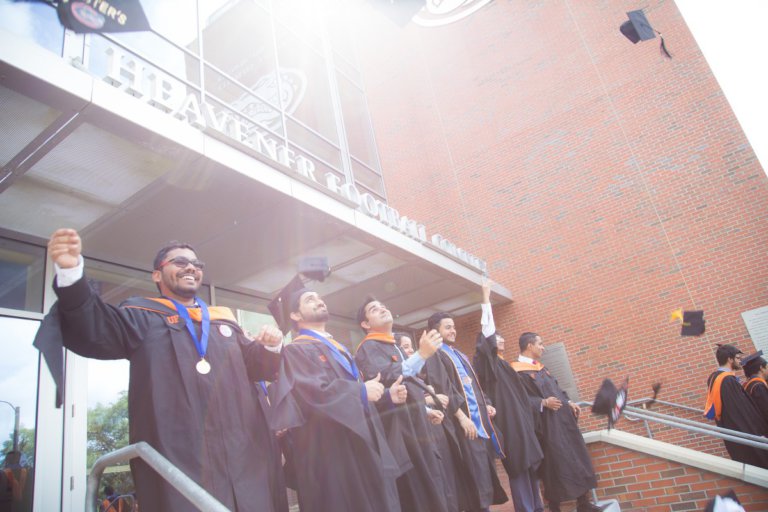
What do the solutions to the world’s biggest challenges have in common? Most of them began with engineering research.
At the University of Florida’s Engineering School of Sustainable Infrastructure & Environment (ESSIE), solving problems related to global sustainability is the bedrock of the graduate student experience. Underpinned by the Department and Civil and Coastal Engineering and the Department of Environmental Engineering Sciences, students are exposed to a diverse array of engineering research options that are key drivers of progress in modern society.

Mariel Ojeda Tuz. Source: University of Florida ESSIE
Civil Graduate Research Assistant Mariel Ojeda Tuz chose ESSIE for the School’s renowned faculty members, as well as infrastructure and resources that are essential to her research development. Environmental Graduate Research Assistant Chad Spreadbury explained, “I enjoy the opportunity to engage in real-world challenges, using science and engineering to research solutions. We get to watch our work create a lasting impact in our fields of study and improve our communities.”
The School aims to give every student the opportunity to realise their educational aspirations, whether they are getting a hands-on learning experience through research and faculty interactions on the sunny, vibrant campus in Gainesville, FL, or in the comfort of their homes through distance learning by UF’s Electronic Delivery of Gator Engineering (EDGE) program.
Visit the official site now to apply or find out more information. In the meantime, read more about the different specialisations in ESSIE and learn how the research areas build fulfilling careers in civil, coastal and environmental engineering.
Department of Civil and Coastal Engineering
Prepare for successful interdisciplinary careers in a robust research environment that focuses on national infrastructure, environment and homeland security.
You can find out more information about all the programmes in the Department clicking here.
- Coastal & Oceanographic Engineering – Join a faculty of wide research interests in coastal physical processes, applying a technical focus to our love for the ocean.
- Coastal Ecosystem Dynamics – Striving to advance fundamental science and provide solutions for resilient coastal communities, this research program prepares engineers for a broad range of careers. This research area is also available through the Department of Environmental Engineering Sciences.
- Engineering Education – Students will investigate all aspects of engineering formation from fundamental studies on the engineering education ecosystem to implementation of new pedagogic approaches. This is also available through the Department of Environmental Engineering Sciences.
- Geosystems Engineering – Get right down to geotechnical and geo-environmental solutions through collaborative, multidisciplinary research efforts in five key areas. This research area is also available through the Department of Environmental Engineering Sciences.
- Materials & Pavement – How can engineering research promote sustainable practices in pavement engineering? This group considers distress mechanisms and failure modes, material characterisation, and optimal design approaches.
- New Infrastructure Planning – Think smart cities, solar solutions, charging stations, and waste management. This research program, formerly known as Public Works, is all about developing greener infrastructure for the future.
- Structural Engineering – Students will learn how to develop sustainable construction methods and manage infrastructure system response when it comes to the durability of materials and infrastructure, health monitoring and more.
- Sustainable Construction Engineering – This research program prepares students to plan, manage, and provide support on big civil projects.
- Transportation Engineering – Learn to develop innovative solutions for urban and regional mobility by studying autonomous and connected vehicles, big data, safety and infrastructure.
- Water Systems – Come develop the engineering research behind the conveyance, treatment, and reuse of various water management systems. Students will also research chemicals, pathogens, and the impact of climate on resources and health. This research area is also available through the Department of Environmental Engineering Sciences.

Source: University of Florida ESSIE
Department of Environmental Engineering Sciences
In this department, graduate students conduct globally-recognised research that guides the prevention and solution of environmental issues at all scales.
You can find out more information about all the programmes in the Department clicking here.
- Air Resources – How are air pollutants created and how do they affect health? This group characterises past, present, and future atmospheres while designing relevant measurement techniques and control technologies.
- Environmental Nanotechnology – Investigate the implications of manufacturing and nanomaterials while exploring the development of nanodevices and materials for environmental remediation, energy production and sustainable manufacturing.
- Sustainable Materials Management – Interested in sustainable engineering research? In this research program, students can focus on energy extraction, recycling and waste disposal in domestic and industrial settings.
- Systems Ecology & Ecological Engineering – Gain an integrative education in science, engineering and policy to develop various interdisciplinary solutions and tools for pressing environmental challenges.
Follow ESSIE on Facebook, Twitter, and Instagram
Liked this? Then you’ll love…
Build a sustainable future through engineering and design
Civil Engineering: Construct a meaningful career with one of these universities







